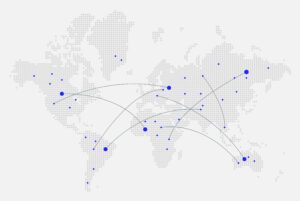Import/Export Business: How Captive Insurance Secures International Trade
Have you ever wondered how products from different countries end up in your local stores? Well, that’s where the import/export business comes into play. It’s like a big global trading game, where goods and services are exchanged between countries.
Dating back to ancient times around the BC era, merchants bartered exotic and everyday goods, like food and cloth. Even now today, the import/export business lays the foundation for the global economy, facilitating the exchange of goods and services between countries. It involves the importation of goods from one country for sale in another, as well as the exportation of domestic products to foreign markets. This dynamic industry brings numerous opportunities for businesses to expand their reach, tap into new markets, and generate profits. However, with these opportunities also come inherent risks that can pose significant challenges to the success and stability of import/export ventures. In this article, we will explore the nature of the import/export business, examine the risks it entails, and discuss how captive insurance can provide crucial protection against these risks through various insurance coverages.
The import/export business involves the buying and selling of goods and services across international borders. Importing refers to the procurement of foreign products for domestic distribution or consumption, while exporting involves the sale of domestic products to foreign markets. This business model serves as a catalyst for global trade, fostering economic growth and international cooperation. It allows countries to leverage their comparative advantages, access resources and products that are not available domestically, and promote cultural exchange. Import/export businesses span various industries, from manufacturing and agriculture to technology and consumer goods.
Despite its potential for profitability, the import/export business is inherently risky. One significant risk is the volatility of international markets and the uncertainty of foreign regulations and customs procedures. Fluctuating exchange rates, trade barriers, tariffs, and import/export restrictions can impact the viability and profitability of transactions. Additionally, political instability, economic crises, and changes in government policies can disrupt trade flows and jeopardize business operations. Market competition, shifting consumer preferences, and supply chain disruptions further contribute to the risks faced by import/export businesses.
Risks to import/export businesses can manifest in different forms. Export credit risk is one such risk, referring to the potential for non-payment or delayed payment by foreign buyers. This risk can arise from the financial instability of buyers, political or economic turmoil in the buyer’s country, or breaches of contract. Another risk is related to transportation, as goods in transit can be damaged, lost, or stolen. This highlights the importance of marine insurance, which provides coverage for cargo during shipment. Political risk is yet another concern, encompassing the potential for expropriation, political violence, or changes in trade policies that negatively impact the business. Finally, international product liability is a risk that arises from defective products causing harm to consumers, leading to legal disputes and financial liabilities.
Captive insurance serves as a valuable tool to control the risks faced by import/export businesses. In contrast to commercial insurance programs, captives allow you to own your own insurance company, giving you the flexibility to choose which coverages, risk & financial management strategies, and potential cost savings you want in your captive insurance arrangement. This makes for captive insurance particularly beneficial to small and middle-market businesses who want to tailor insurance programs according to their specific needs and risk profiles without relying solely on standardized commercial insurance offerings.
Export credit insurance is a form of insurance that can be easily adopted in a captive insurance program that protects businesses against the risk of non-payment or delayed payment by foreign buyers. It provides coverage for commercial and political risks associated with international trade transactions, ensuring that businesses receive payment for their exported goods. Marine insurance is another crucial coverage, safeguarding against the risks of loss or damage to goods during transportation by sea. It covers perils such as vessel accidents, piracy, and natural disasters, providing financial protection for importers and exporters.
Nowadays, political risks are changing by the hour due to rising tensions between major powers like the US and China, as well as ongoing conflicts between nations like Ukraine and Russia. These political tensions and wars can disrupt the global trade network by leading to trade barriers, sanctions, and geopolitical instability, causing significant economic and business uncertainties. Therefore, political risk insurance is specifically designed to address the risks stemming from political instability, government actions, or geopolitical events. It offers coverage for losses incurred due to political violence, expropriation, currency inconvertibility, and contract frustration. This coverage helps import/export businesses navigate the uncertainties associated with doing business in foreign countries with volatile political climates.
Finally, international product liability insurance offers protection against potential liabilities arising from defective products. It covers legal expenses, settlements, and judgments associated with product-related injuries or damages, ensuring import/export businesses can mitigate the financial repercussions of such incidents.
The import/export business is a crucial component of the global economy, offering opportunities for growth and expansion. However, it is not without risks. The volatility of international markets, uncertainties of foreign regulations, and various other factors can pose significant challenges to import/export businesses. To mitigate these risks, captive insurance provides essential coverage through export credit insurance, marine insurance, political risk insurance, and international product liability insurance. These insurance coverages help businesses safeguard their financial interests, manage potential losses, and ensure the smooth functioning of international trade. By understanding and addressing the risks inherent in the import/export business, businesses can navigate the complexities of the global marketplace with greater confidence and resilience.





